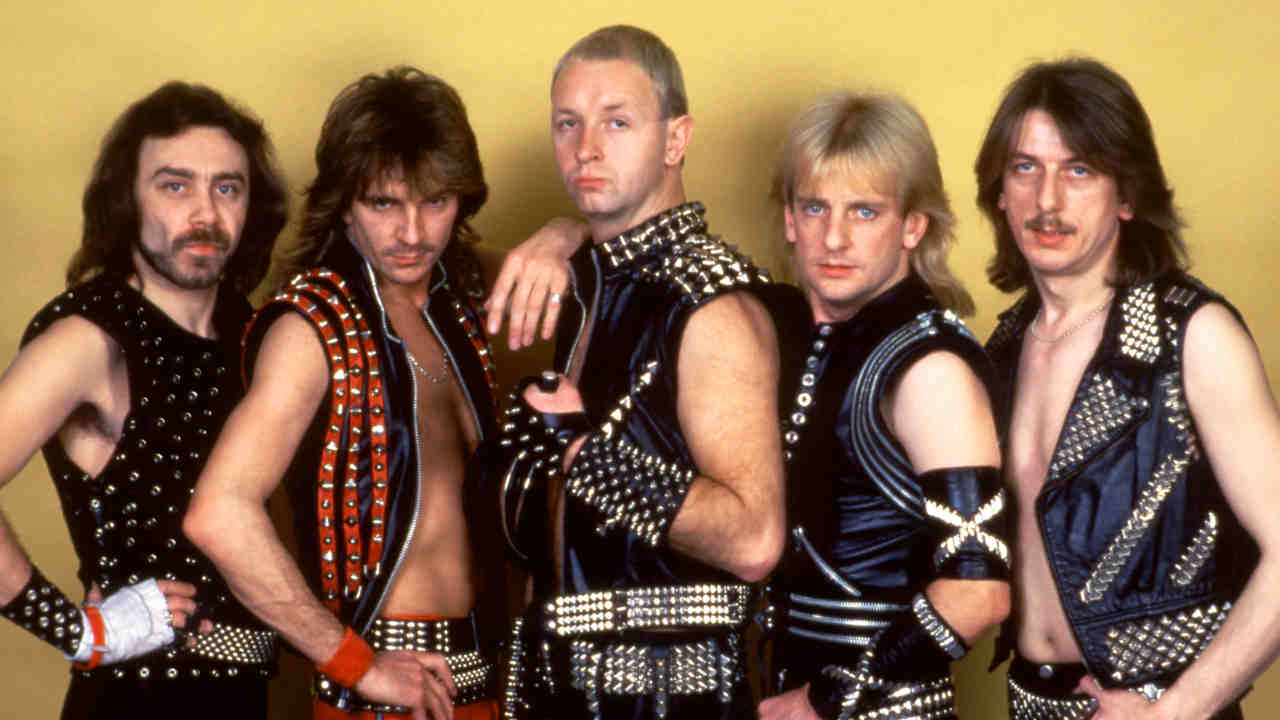Rod Argent: 10 Records That Changed My Life
Zombies and Argent mainman Rod Argent picks 10 records that blew his mind and shaped his career

Rod Argent's route into music wasn't as straightforward as some.
"I was born in 1945, so I was only five years old at the beginning of the fifties," says The Zombies founder. "It wasn't a great period. I was always passionate about music, but I wasn't completely knocked out by the popular music of the time because it was so anodyne!
"My mother was a classical music fan, but the stuff she liked was the lollipop, well-known romantic stuff, so that was really all I heard. Then she got me involved in a cathedral choir, which was an introduction to so much fantastic music!"
More than half a century later, Argent's adventure is continuing. The Zombies celebrated 50 years of their psychedelic masterpiece Odyssey And Oracle last year, playing a series of dates that culminated at London’s historic Palladium, where the band's original band line-up played the album in full.
Below, Argent picks 10 albums that have accompanied him on his journey.

Elvis Presley - Hound Dog
"When I was 11, I wandered down to my cousin Jim Rodford's house, which was about 400 yards away. He was in one of the first electric bands in the whole of the south of England, and he was four years older than me, so there was a little bit of hero worship going on.
"He was playing some Bill Haley records, and I quite liked them, but it didn't really turn me on. And then he said to me, 'try this!' and in three minutes my whole life changed. He played me Elvis Presley singing Hound Dog, and for six months – to my mother's absolute horror – I didn't want to hear anything but the rawest rock'n'roll I could lay my hands on. I always think of that moment as my introduction to black music by proxy. It made me vow to form a band as soon as I could get one together, and it made me fall in love with rock and roll."
Sign up below to get the latest from Classic Rock, plus exclusive special offers, direct to your inbox!
The Beatles - Please Please Me
"By the time I was 15 I'd got a few guys together. We are going for about a year before The Beatles came out. Unusually, we were singing harmonies (they were doing it too, but we didn't know that). I remember hearing Love Me Do and being intrigued, but I couldn't really work it out. It sounded almost a bit Eastern, the way McCartney was singing.
"The next record that came out was Please Please Me, and it completely blew my socks off, to the extent that it had an enormous influence on what we were doing... as I believe it did on every other rock'n' roll musician and band! It was an immensely commercial sound, but it was also uncommercial in the sense that they were driven by what they wanted to hear, and what they felt worked. They were completely true and honest to themselves, and that burst out of the grooves."
Spencer Davis Group - Georgia On My Mind
"I can't overestimate the effect that Stevie Winwood's amazing voice had, and his wonderful soulful piano and organ playing. He came out of nowhere and blew people away. I remember Paul Jones [Mannfred Mann singer] saying, 'I've been in a blues band for four years, and suddenly this 17-year-old-kid comes out and he sounds like Ray Charles, and he plays like him!' What a talent: to emerge fully-formed at that age was extraordinary, and it had a huge effect on every musician around that time."
Ray Charles - Drowned In My Own Tears
"There was an album called Ray Charles In Person that came out in 1959. It was recorded at a concert in Georgia by a local DJ, who decided to record it for his radio station. He hung one mic over the audience, and it's the most wonderful recording. It still sounds fabulous!
"I was about 17 when I discovered it, but I remember coming home from the pub every night when my parents have gone to bed, and I would go to the "radiogram" and – very quietly – I would put the Ray Charles In Person album on. I'd just be in heaven listening to that wonderful soil and grit. There was a version of Drowned in My Own Tears which was already recorded, but he did it much faster on the studio album. Live, he did it funereally slowly, and My God! It had so much soul!"
Miles Davis - Milestones
"I heard some bebop coming out of a window on a country lane I used to walk down, and I was intrigued by this. It was probably Charlie Parker, and it sounded so alien compared to what I already knew, but it fascinated me. And when I heard Milestones it just blew me away! I can still sing every note on every solo.
"It had a relevance that I didn't realise until years later, on one of the first songs I wrote – She's Not There – which became number one in America. It was Miles's first foray into using modal scales rather than just chord sequences. I remember going to see Pat Metheny when he was just emerging, and I was amazed he knew who I was. He told me that She's Not There was the record that offered him a way into what he wanted to do, because of all the modal stuff I'd used. I was completely speechless, and thought, 'there's no modal stuff in there!' But I played it, and I realised I'd been doing it intuitively because I'd been listening to so much Miles Davis!"
Jimmy Smith - Walk On The Wild Side
"The first time I heard Jimmy Smith was Walk On The Wild Side, from his Bashin' album. It was so exciting! It brought together the rhythm and blues feeling I loved with the jazz stuff I was also in love with.
"I absolutely adored it, and I wasn't the only one. Many years later I was talking about this to Jim Rodford, and he told me that John Steele from the Animals would imagine he was playing the drum part from Walk On The Wild Side when he was playing House Of The Rising Sun.
"I think English musicians had more eclectic sources than almost anywhere else in the world, and that was part of what made the English sound of that time. Record companies did not know what was going on, so they let musicians get on with it. You could be cutting-edge and people would let you do it, and audiences responded with huge enthusiasm. I think that's something we've really lost."
Cream - Sunshine Of Your Love
"Like with The Beatles, I wasn't knocked out the first time I heard Cream, which was Wrapping Paper, their first single. But when Sunshine Of Your Love came out it brought all that soulfulness together with some wonderful jazz influences in a way that wasn't self-conscious at all. You had the wonderful imagery of Jack Bruce, you had Ginger Baker playing a drum part that no other drummer in the world would have played, and you had the wonderful lyricism of Clapton."
Stevie Wonder - Looking For Another Pure Love
"I was a bit fed up with everything I was hearing, so I wandered out and bought two albums on the spur of the moment. I hadn't heard Music Of My Mind, but I remembered the things he done as little Stevie Wonder, and so I bought Talking Book.
"I took it home and I didn't even play it the following weekend. It was gorgeous and inspiring, and filled me with warmth. The soul and the personality and the personal commitment to what he was doing on his albums was just really fabulous."
Mahavishnu Orchestra - The Inner Mounting Flame
"The other album I bought that weekend and didn't play until the following week was the Mahavishnu Orchestra's The Inner Mounting Flame. I have no idea why I bought it, and having been completely knocked out by Stevie Wonder's warmth I put on The Inner Mounting Flame and My God, there it was again, in a different form. It was this ecstatic, fantastically-played, committed bunch of tracks. It hit me in a way that The Beatles had hit me with Please Please Me. Everything was ascending. Everything was soaring. And it was full of joy."
The Police - Every Little Thing She Does Is Magic
"I love the spontaneity of it, the huge energy, and the way the song is constructed as well: the marvellous ascending bass part, and some great drumming from Stewart Copeland. In combination with what Andy Summers was playing it was perfect. It filled me with a desire to listen to all their other stuff.
"I'm a big fan of Sting because he gave up what was perhaps the most successful band in the world because he wanted to follow his own feelings. it wasn't terribly commercial, but he didn't care. He just did what he wanted to do. You've only got one life, and you've got to go out there and get the best out of yourself."

Online Editor at Louder/Classic Rock magazine since 2014. 40 years in music industry, online for 27. Also bylines for: Metal Hammer, Prog Magazine, The Word Magazine, The Guardian, The New Statesman, Saga, Music365. Former Head of Music at Xfm Radio, A&R at Fiction Records, early blogger, ex-roadie, published author. Once appeared in a Cure video dressed as a cowboy, and thinks any situation can be improved by the introduction of cats. Favourite Serbian trumpeter: Dejan Petrović.
